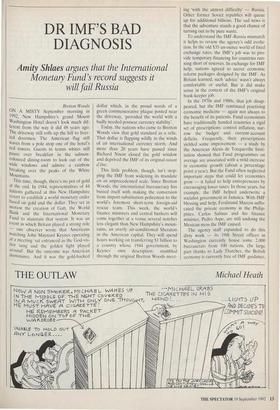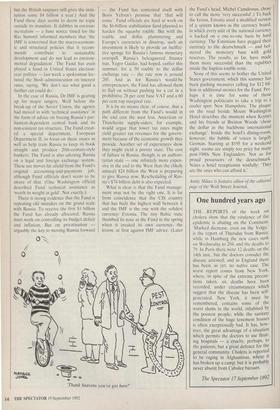DR IMF'S BAD DIAGNOSIS
Amity Shlaes argues that the International
Monetary Fund's record suggests it will fail Russia
Bretton Woods ON A MISTY September morning in 1992, New Hampshire's grand Mount Washington Hotel doesn't look much dif- ferent from the way it did 48 years ago. The driveway still rolls up the hill to liver- ied doormen. The American flag still waves from a pole atop one of the hotel's red towers. Guests in tennis whites still pause over breakfast in the salmon- coloured dining-room to look out of the Wide windows and admire a rainbow breaking over the peaks of the White Mountains.
This time, though, there's no pot of gold at the end. In 1944, representatives of 44 nations gathered at this New Hampshire resort to establish a world monetary order based on gold and the dollar. They set in motion the creation of Gan, the World Bank and the International Monetary Fund to maintain that system. It was an event in which Britain played a strong role — one observer wrote that Americans watching John Maynard Keynes operating a meeting 'sat entranced as the God-vis- nor sang and the golden light played around'. But the outcome was American dominance. And it was the gold-hacked dollar which, in the proud words of a green commemorative plaque posted near the driveway, 'provided the world with a badly needed postwar currency stability'.
Today, the nations who came to Bretton Woods view that gold standard as a relic. That dollar is flapping wildly in the winds of an international currency storm. And more than 20 years have passed since Richard Nixon closed the gold window and deprived the IMF of its original raison d'etre.
This little problem, though, isn't stop- ping the IMF from widening its mandate on an unprecedented scale. Since Bretton Woods, the international bureaucracy has busied itself with making the conversion from import-substitution policeman to the world's foremost short-term foreign-aid rescue team. This week, the world's finance ministers and central hankers will come together at a venue several notches less elegant than New Hampshire's moun- tains, an overly air-conditioned Sheraton in the American capital. They will spend hours working on transferring $1 billion to a country whose 1944 government, by Keynes' own description, stumbled through the original Bretton Woods meet- ing 'with the utmost difficulty' — Russia. Other former Soviet republics will queue up for additional billions. The sad news is that the adventure stands a good chance of turning out to be pure waste.
To understand the IMF-Russia mismatch it helps to review the agency's odd evolu- tion. In the old $35-an-ounce world of fixed exchange rates, the IMF's job was to pro- vide temporary financing for countries run- ning short of reserves. In exchange for IMF help, nations agreed to secret economic reform packages designed by the IMF. As Britain learned, such 'advice' wasn't always comfortable or useful. But it did make sense in the context of the IMF's original hook-keeper job.
In the 1970s and 1980s, that job disap- peared, but the IMF continued practising economic medicine — again not always to the benefit of its patients. Fund economists have traditionally handed countries a rigid set of prescriptions: control inflation, nar- row the budget and current-account deficits. Frequently, their prescriptions yielded some improvement — a study by the American Alexis de Tocqueville Insti- tution showed that Fund programmes on average are associated with a mild increase in economic growth (about a percentage point a year). But the Fund often neglected important steps that could let economies grow — it failed to help entrepreneurs by encouraging lower taxes. In those years, for example, the IMF helped underwrite a socialist government in Jamaica. With IMF blessing and help, Ferdinand Marcos suffo- cated the private economy in the Philip- pines. Carlos Salinas and his finance minister, Pedro Aspe, are still undoing the Mexican mess the IMF caused.
The agency staff expanded to do this dirty work — its 19th Street offices in Washington currently house some 2,0(K) bureaucrats from 100 nations. (In large part thanks to Lady Thatcher, the British economy is currently free of IMF guidance, but the British taxpayer still gives the insti- tution some $4 billion a year.) And the Fund these days seems to deem no topic outside its mandate. It dabbles in environ- mentalism — a June notice timed for the Rio Summit informed members that 'the IMF is concerned that the macro-econom- ic and structural policies that it recom- mends contribute to sustainable development and do not lead to environ- mental degradation'. The Fund has even played a hand in United States election- year politics — last week a spokesman lec- tured the Bush administration on interest rates, saying, 'We don't see what good a further cut could do.'
In the case of Russia, Dr IMF is gearing up for major surgery. Well before the break-up of the Soviet Union, the agency had moved in with 'technical assistance' in the form of advice on freeing Russia's par- liament-dependent central hank and its non-existent tax structure. The Fund creat- ed a special department. European Department IL to focus on these issues as well as help train Russia to keep its book straight and produce 20th-century-style hankers. The Fund is also advising Russia on a legal and foreign exchange system. These are moves far afield from the Fund's original accounting-and-payments job, although Fund officials don't seem to he aware of that. (One Washington official described Fund technical assistance as 'worth its weight in gold'. Not exactly.) There is strong evidence that the Fund is repeating old mistakes on the grand scale with Russia. To receive the first $1 billion the Fund has already allocated. Russia must work on controlling its budget deficit and inflation. But on privatisation arguably the key to moving Russia forward — the Fund has contented itself with Boris Yeltsin's promise that 'that will come'. Fund officials are hard at work on the $6-billion stabilisation fund planned to harden the squashy rouble. But with the rouble and dollar plummeting and Europe's currencies in disarray, such an investment is likely to provide an ineffec- tive sponge for Russia's famous monetary overspill. Russia's beleaguered finance tsar, Yegor Gaidar, had hoped, earlier this summer, for a 50 rouble to the dollar exchange rate — the rate now is around 205. And as for Russia's would-he entrepreneurs, the Fund has allowed them to flail on without pushing for a cut in a prohibitive 28 per cent base VAT and a 60 per cent top marginal rate.
It is by no means clear, of course, that a path different from the Fund's would in the end cost the west less. American or Thatcherite supply-siders, for example, would argue that lower tax rates might yield greater tax revenues for the govern- ment because of the economic growth they provide. Another set of experiences show they might yield a poorer state. The cost of failure in Russia, though, is an authori- tarian state — one infinitely more expen- sive in the end to the West than the (likely annual) $24 billion the West is preparing to give Russia now. Rescheduling of Rus- sia's $74 billion debt is also expected.
What is clear is that the Fund manage- ment may not he the right one. It is far from coincidence that the CIS country that has built the highest wall between it and the IMF is the one with the solidest currency: Estonia. The tiny Baltic state thumbed its nose at the Fund in the spring when it created its own currency, the kroon, at first against IMF advice. (Later
'Thank heavens you've got here!'
the Fund's head, Michel Camdessus, chose to call the move 'very successful'.) To back the kroon, Estonia used a modified version of a system known as the currency board, in which every unit of the national currency is backed on a one-to-one basis by hard currency. The Estonians have pegged their currency to the deutschmark — and bol- stered the monetary base with gold reserves. The results, so far, have made them more successful than the republics inside the hapless rouble zone. None of this seems to bother the United States government, which this summer has been pushing measures calling for $12 bil- lion in additional monies for the Fund. Per- haps it is time for some of those Washington politicians to take a trip to a cooler spot: New Hampshire. The plaque on the road beside Mount Washington Hotel describes the moment when Keynes and his friends at Bretton Woods 'chose the dollar as the backbone international exchange'. Inside the hotel's dining-room. however, the babble of voices is largely German. Starting at $195 for a weekend night, rooms are simply too pricy for many post-I 980s New Englanders. Not so for proud possessors of the deutschmark. Notes a hotel receptionist wistfully: 'They are the ones who can afford it.'
Amity Shlaes is features editor of the editorial page of the Wall Street Journal.



























































 Previous page
Previous page